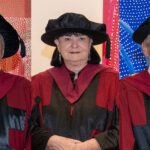Curtin University has awarded five of its leading researchers with the title of John Curtin Distinguished Professor, the highest title the University can bestow on its academic staff.
Professor Christine Erbe and Professor Abhijit Mukherjee from Curtin’s Faculty of Science and Engineering, Professor Kim Scott from the Faculty of Humanities, and Professor Melinda Fitzgerald and Professor Peter Gething from the Faculty of Health Sciences, have been awarded the prestigious title.
Curtin University Vice-Chancellor Professor Harlene Hayne congratulated each of the recipients for their exceptional research and leadership.
“The title of John Curtin Distinguished Professor recognises an academic’s significant and sustained contribution to the University and the wider community throughout their distinguished career,” Professor Hayne said.
“Each of these Professors make a significant impact in their research and teaching, contributing enormously to Curtin’s research reputation on an international level. They are all most worthy recipients of this prestigious title.”
The title of John Curtin Distinguished Professor, introduced in 2005, is for academics with exceptional teaching expertise, research skills, or scholarly, creative or artistic achievements, a significant record of public service and an established national or international reputation.
In addition, the University has awarded the title of Emeritus Professor to former interim Vice-Chancellor Professor John Cordery, former Pro Vice-Chancellor of the Faculty of Business and Law Professor Nigel de Bussy, former Deputy Vice-Chancellor, Academic Professor Jill Downie, and former Director of Curtin’s Institute of Geoscience Research, Professor Andrew Putnis.
The new recipients awarded the title of John Curtin Distinguished Professor are:
Professor Christine Erbe, Director of the Centre for Marine Science and Technology at Curtin. She has been instrumental in establishing a number of research programs, including an Australia-Mauritius Marine Science Centre, a multi-year program with the offshore oil and gas industry, and projects with maritime defence. Her research expertise on how human-induced underwater noise interferes with animal acoustic communication helps industry and government to understand the impact on the ocean environment of offshore activities such as shipping, oil and gas exploration and production, offshore wind farms, and port development.
Professor Abhijit Mukherjee, Director of Curtin’s Bio-activated Materials Laboratory, Dean International South Asia and an internationally renowned Civil Engineer, innovator and researcher. His research attempts to significantly alleviate the huge greenhouse gas emissions from construction and emulates the natural process of bio-cementation to synthesise future zero emission construction materials. His research has contributed to significantly prolonging the service life of Australian assets, which has considerable social benefits. Professor Mukherjee is a Thomas Howard Medallist, a Fellow of the National Academies of both Sciences and Engineering in India and a former Concrete Technologist of the Year.
Professor Kim Scott, a Professorial Future Fellow, multi-award winning Nyungar author and former Western Australian of the Year. He is a renowned storyteller and one of the top literary talents in Australia, taking out the prestigious Miles Franklin Literary Award twice for his works which delve into the culture and history of the Nyungar people. Recently awarded an ARC Future Fellowship, Professor Scott is working to investigate how digital technologies in combination with on-country camps may consolidate, enhance and help share Aboriginal heritage, culture and language.
Professor Melinda Fitzgerald, Professor of Neurotrauma, Dean of Research in the Faculty of Health Sciences at Curtin, and a leading concussion researcher from the Curtin Health Innovation Research Institute (CHIRI) and the Perron Institute for Neurological and Translational Science. CEO and founder of not-for-profit Connectivity, Professor Fitzgerald is an accomplished researcher, mentor and leader, who works tirelessly to develop predictive approaches and treatment strategies and to improve outcomes for people impacted by traumatic brain injury.
Professor Peter Gething, the Kerry M Stokes AC Chair and Professor of Epidemiology from the Curtin School of Population Health and Telethon Kids Institute. Professor Gething is an internationally recognised epidemiologist, who uses data analytics and geospatial modelling to help answer important questions and improve policies around infectious diseases, including COVID-19. Professor Gething has dedicated his career to improving public health policy and currently leads the Malaria Atlas Project, an international collaboration providing geospatial intelligence on global malaria epidemiology and his group is also the World Health Organisation Collaborating Centre for Geospatial Modelling.



